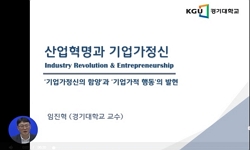산업구조의 고도화와 경제성장률 둔화로 인해 기존 기업에서의 일자리 공급이 부족한 상태가 지속됨에 따라 창업이 일자리 창출의 대안으로 중요시되고 있다. 특히 청년들의 취업 기회가 ...
http://chineseinput.net/에서 pinyin(병음)방식으로 중국어를 변환할 수 있습니다.
변환된 중국어를 복사하여 사용하시면 됩니다.
- 中文 을 입력하시려면 zhongwen을 입력하시고 space를누르시면됩니다.
- 北京 을 입력하시려면 beijing을 입력하시고 space를 누르시면 됩니다.
역할모델 노출과 창업 교육이 청년 창업의지에 미치는 영향: 사회적 네트워크의 조절효과를 중심으로
한글로보기https://www.riss.kr/link?id=G3747311
- 저자
-
발행기관
-
-
발행연도
2015년
-
작성언어
Korean
- 주제어
-
자료형태
한국연구재단(NRF)
-
0
상세조회 -
0
다운로드
부가정보
국문 초록 (Abstract)
산업구조의 고도화와 경제성장률 둔화로 인해 기존 기업에서의 일자리 공급이 부족한 상태가 지속됨에 따라 창업이 일자리 창출의 대안으로 중요시되고 있다. 특히 청년들의 취업 기회가 낮은 상태가 지속되면서 청년 창업의 중요성이 커지고 있어, 청년들이 창업이라는 의사결정을 하는데 있어 미치는 영향요인을 규명하는 연구의 필요성이 높다. 이에 본 연구에서는 창업인재 육성이라는 측면에서 국내의 일반 청년 605명을 대상으로 한 설문조사를 통해 가족과 지인의 역할모델 노출 경험이 Ajzen의 계획된 행동이론의 심리적 변수들을 매개로 청년들의 창업의도에 어떻게 영향을 미치는지를 밝히고자 하였다. 실증분석 결과는 다음과 같다. 첫째, 가족 역할모델과 지인 역할모델은 계획된 행동이론의 심리적 변수들(창업에 대한 태도, 주관적 규범, 자기 효능감)과 정(+)의 관계를 가지며, 계획된 행동이론의 심리적 변수들과 창업의도 간에도 정(+)의 관계가 나타났다. 둘째, Ajzen의 계획된 행동이론의 변수들이 역할모델 노출 경험과 창업의도 사이에서 매개 역할을 하고 있음을 확인할 수 있었다. 특히, 계획된 행동이론의 심리 변수인 ‘태도, 주관적 규범, 자기 효능감’은 가족 역할모델 노출 경험과 창업의도의 관계를 완전 매개하는 것으로 나타났다. 본 연구는 역할모델을 가족 역할모델과 지인 역할모델로 나누어 구조방정식을 통해 창업의도와의 인과관계 효과를 살펴봄으로써, 가족 역할모델이 계획된 행동이론의 심리 변수를 통해서만 창업의도에 영향을 준다는 점을 밝혔다는 점에서 기존 연구들과 차별점을 갖는다.
다국어 초록 (Multilingual Abstract)
The purpose of this research was to investigate what factors can promote the Korea's young people to be self-employed through business start-up. On basis of a literature review, we designed an empirical research model to examine the mechanism how the ...
The purpose of this research was to investigate what factors can promote the Korea's young people to be self-employed through business start-up. On basis of a literature review, we designed an empirical research model to examine the mechanism how the role model exposure influences on entrepreneurial intention. This study categorized the role model exposure into two variables: family role model exposure and peer role model exposure. Further, Ajzen's (1991) Theory of Planned Behavior (TPB) model was used to verify the mediating role of psychological factors that fill the gap between role model exposure and entrepreneurial intention.
To test the hypotheses, a survey was conducted to target 20~39 ages people in Korea and the empirical analysis was finally done with the surveys of effective 605 Korean young people. We employed SPSS 21.0 and AMOS 21.0 for validity, reliability, confirmatory factor analysis, and structural model analysis.
The results revealed that family role model exposure and peer role model exposure gave a positive effect to psychological variables (entrepreneurial attitude, subjective norm and entrepreneurial self-efficacy) of Ajzen’s TPB model. And those psychological variables gave a positive effect to entrepreneurial intention. Meanwhile, while the direct imp











